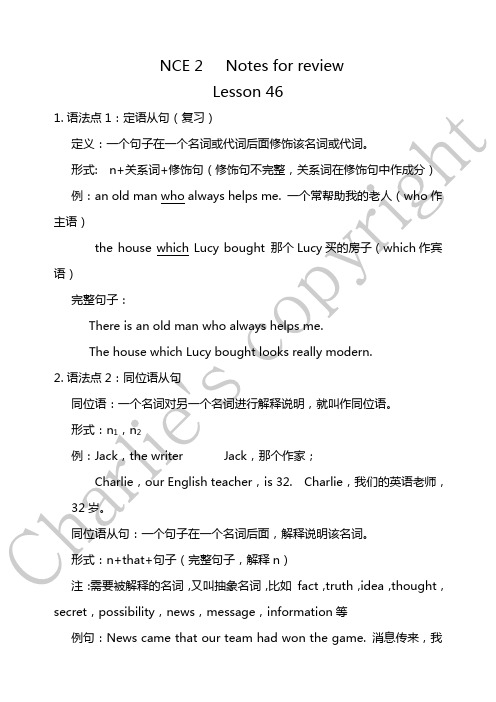新概念二Lesson 46 知识点整理
- 格式:doc
- 大小:71.50 KB
- 文档页数:4

新概念英语(2)Lesson46 动词+介词的用法Name:一.介词to1. accustom// v.使习惯1). accustom to sth../doing sth.2). be accustomed to sth / doing sth. (比be used to do sth.正式) 习惯于做某事Eg.1). He had to accustom himself to the cold weather. 他必须让自己习惯寒冷的天气。
2). I’m not used to getting up early. 我不习惯早起。
1. amount / / v. 合计,总共达+toEg. The expense/ / (支出)amounted to 10000 yuan .合计支出一万元。
3. appeal / / v. 呼吁,要求,求助于+toEg. 1). He appealed them for help. 他要求他们帮助他。
2). They must appeal to arms. 他们求助于武力。
4. apply / / v. 应用,证实,适用,申请Eg. 1). We should apply a theory / / (理论)to practice .我们应该理论应用于实践。
2). The rule doesn’t apply to children.这项规章不适合孩子。
3). apply to sb. for help . 向某人申请帮助5. attach/ / v. 系,缚,(=fasteners,fix ) + toEg. He attached all the labels to the bags .他把所有的袋子都系/贴上标签。
6. attend / / v.注意attend to sth./ doing sth .= pay attention to sth./doing sth. 注意某物/做某事Eg. You must attend to your handwriting.= You must pay attention to your handwriting. 你必须注意你的书写。


NCE 2 Notes for reviewLesson 461.语法点1:定语从句(复习)定义:一个句子在一个名词或代词后面修饰该名词或代词。
形式: n+关系词+修饰句(修饰句不完整,关系词在修饰句中作成分)例:an old man who always helps me. 一个常帮助我的老人(who作主语)the house which Lucy bought 那个Lucy买的房子(which作宾语)完整句子:There is an old man who always helps me.The house which Lucy bought looks really modern.2.语法点2:同位语从句同位语:一个名词对另一个名词进行解释说明,就叫作同位语。
形式:n1,n2例:Jack,the writer Jack,那个作家;Charlie,our English teacher,is 32. Charlie,我们的英语老师,32岁。
同位语从句:一个句子在一个名词后面,解释说明该名词。
形式:n+that+句子(完整句子,解释n)注:需要被解释的名词,又叫抽象名词,比如fact,truth,idea,thought,secret,possibility,news,message,information等例句:News came that our team had won the game. 消息传来,我们的队伍赢得了比赛。
(that our team had won the game就是解释news 的内容,而且为了避免头重脚轻,此句中that从句放在了最后。
)3.词汇- unload v. 卸货,退子弹词根:load v.装载,加载;变形:loading 加载中;reload v.重新装,换弹;download v. 下载;upload v. 上传;overload v. 超载;- occur v. 发生用法:It (suddenly)occurs/occured to sb to do sth 某人突然想起做某事It(suddenly)occurs/occured to sb that+句子某人突然想起......- astonish v. 使惊讶变形:astonished 感到惊讶的;astonishing 令人惊讶的词组:be astonished at 对...感到惊讶- goods n. 货物,商品词组:household goods 家庭用品;imported goods 进口商品woollen goods 羊毛制品;luxury goods 奢侈品- discover v. 发现名词:discovery 发现区分find和discoverfind:找到,偶然发现或找到丢失的东西discover:探索发现,找到本身存在但不被认知的事物- admit v. 承认同义词:confess 承认用法:admit doing sth 承认做过某事反义:deny doing sth 否认做过某事。

逐句精讲新概念英语第二册:第46课既昂贵又受罪Lesson46 Expensive and uncomfortable 新概念2课文内容:When a plane from London arrived at Sydney airport, workers began to unload a number of wooden boxes which contained clothing. No one could account for the fact that one of the boxes wasextremely heavy. It suddenly occurred to one of the workers to open up the box. He was astonished at what he found. A man was lying in the box on top of a pile of woolen goods. He was so surprised at being discovered that he did not even try to run away. After he was arrested, the man admitted hiding in the box before the plane left London. He had had a long and uncomfortable trip, for he had been confined to the wooden box for over eighteen hours. The man was ordered to pay $3,500 for the cost of the trip. The normal price of a ticket is $2,000! 语法归纳:同位语从句一句话总结:从句的内容作同位语。


新概念英语第二册Lesson46~48课文注释新概念英语第二册Lesson46课文注释1.…workers began to unload a number of wooden boxeswhich contained clothing.……工人们开始卸下装有服装的一批木箱。
(1)unload的含义为“卸(货)”,它的反义词为load(装货)。
与形容词 uncomfortable, unsmiling等相似,有些动词加前缀un能够表示做相反的动作。
(2)a number of为固定词组,表示“若干”、“很多”:You've made a number of mistakes in typing this letter.你打这封信时出了很多错误。
(3)clothing是服装的总称,为不可数名词,其含义比clothes更为广泛。
clothes一般指衣服,clothing则能够包括鞋、帽等。
2.No one could account for the fact that one of the boxes was extremely heavy. 其中有只箱子特别重,可谁也弄不清是怎么回事。
(1)短语动词 account for的含义为“说明理由”、“作出说明(或解释)”:The bad weather in England accounts for Harrison'sdecision to leave the country.英国糟糕的气候是哈里森决定离开这个国家的原因。
How do you account for the battered car?你如何解释这撞坏的车?(2)that后面的从句为fact的同位语从句,说明fact的具体内容:He couldn't explain the fact that Mary's wallet was found in his room.他无法解释玛丽的钱包是在他房间里找到的这个事实。
新概念英语第2册第46课重点内容总结重要句型或语法1、动词与介词to、at、for、with的搭配用法该部分所提供的动词都是较为常用的,在各类英语考试中经常会考到。
具体的内容可参考教材第208-209页的说明和练习。
课文主要语言点When a plane from London arrived at Sydney airport, workers began to unload a number of wooden boxes which contained clothing. 1)arrive at+小地方,arrive in+大地方。
2)unload,卸货。
源自load(装载。
3)a number of,很多大量。
注意与the number of(...的数量)的区别:a number of后接复数可数名词,谓语动词要用复数;the number of后接复数可数名词,但谓语动词要用单数。
4)wooden,木制的。
源自wood(木头),woods表示树林。
-en加在名词后面,构成形容词。
类似的构词还有课文后面出现的woollen。
5)which引导的定语从句修饰先行词wooden boxes。
contain,表示包含、包括。
clothing,表示衣服的总称。
No one could account for the fact that one of the boxes was extremely heavy. 1)account for,解释、说明。
2)that引导的是同位语从句,解释说明the fact的具体内容。
英语中经常会后接同位语从句的名词还有suggestion、idea、order、news等。
3)extremely,极度地、非常。
源自extreme(极度的、极端的)。
It suddenly occurred to one of the workers to open upthe box. 1)sth. occur to sb.,某人突然想起,to是个介词。
Expensive and uncomfortable 既昂贵又受罪Lesson 467-17-2014 New words and expressionsunload v卸(货)wooden adj木制的extremely adv非常,极其occur v发生astonish v使惊讶pile n堆woollen n羊毛的goods n(常用复数)货物,商品discover v发现admit v承认confine v关在(一个狭小的空间里)normal adj正常的,通常的load [ləud]1n负荷物,载荷物(尤指沉重的)a load of sand运载的一批沙子2n(精神方面的)负担,重荷,忧虑,劳苦a heavy load of guilty沉重的负疚感eg Her recovery took a load off my mind. 她恢复健康使我卸下心中重担。
3v装载,使….负荷load a lorry with bricks往卡车上装砖load bricks onto a lorry把砖装上卡车lorry ['lɔri] n运货汽车,卡车truck [trʌk]n货车,卡车,载重汽车(美)4v装(胶卷,弹药,数据或程序)load a new film into the camera 把新胶卷装进照相机eg. Be careful. The gun is loaded.小心,这把枪子弹已经上膛。
unload [,ʌn'ləud] vi从…卸下货物vt摆脱eg Would you help me unload my car? 请你帮我把车上的货卸下来好吗?eg The workers were unloading the cargos from the ship. 那些工人正忙着把船上的货物卸下来。
un---与动词结合,表示原词提及的行为过程或状态被逆转过来unloosen [ʌn'lu:sən]v(把结等)解开uncover v掀开unlock v开锁unwrap v打开包装untie v解开unroll [ʌn'rəʊl]v(把卷着的东西)展开,打开undress v脱掉download v下载wooden ['wudn] adj木制的,木造的a wooden chair一把木椅子eg The house is wooden.这房子是木制的。
Lesson 46 Expensive and uncomfortable 既昂贵又受罪学习目标全解必记单词unload vt. 卸货,解除…负担wooden adj. 木质的extremely adv. 极端,非常occur v. 1.发生2.出现3.(to) 想起,想到astonish vt. 使惊讶,使惊恐pile n. 一堆,一叠vt. (把…) 堆积woollen adj. 羊毛制的goods n. 1.货物,商品(常用复数)2.财产discover v. 发现,暴露,显示admit v. 1. 让…进入,接纳2. 承认confine v. 1.把…限制在(某范围内)2.管制,禁闭normal adj. 1.正常的,普通的2.正规的,标准的常考短语a number of 许多account for 说明原因,解释……occur to……想起……on top of 在…之上admit doing sth. 承认做某事经典句型1.When a plane from London arrived at Sydney airport,workers began to unload a number of wooden boxes,which contained clothing.2.No one could account for the fact that one of the boxes wasextremely heavy.3.It suddenly occurred to one of the workers to open up thebox.4.After he was arrested, the man admitted hiding in the boxbefore the plane left London.5.He was so surprised at being discovered that he did noteven try to run away.重点语法介词动词搭配的短语介词动词由“动词+介词”构成,常与动词搭配的介词有:with, to, at, for等。
以下是对Lesson25—Lesson48中出现的介词动词作的归纳总结:be surprised/ astonished at…对…感到吃惊sympathize with sb. 同情某人arrive in/ at 到达complain of/ about 抱怨speak of 说到put up 举起/ 搭建put out 扑灭wake up 叫醒believe in 信任call out to…对…大叫call for 要求call on/ at 拜访laugh at 嘲笑make out 辨认make up 编造wrap up 包裹find out 查明set out/ off for 出发前往重点语法set about doing 着手从事worry about 担心pick up 捡到be amused at 感到好笑/开心look forward to 盼望dream of 梦想settle down in…在…定居think of 想到operate on 给…动手术succeed in doing…做某事成功ask for sb. 要求见某人enquire about 询问remind sb. of…使某人想起…run into 撞上/遭遇到admit to doing 承认catch up with赶上account for 解释…理由be confined to 局限于turn on/ off 打开/关上give away 背叛;赠送教材全解1.When a plane from London arrived at Sydney airport,workers began to unload a number of wooden boxes, which contained clothing.当一架来自伦敦的飞机抵达悉尼机场时,工人们开始卸下来装有服装的一批木箱。
clothes和clothing均可用作“衣服”的统称,但在用法上仍有差别:clothes:是个没有单数形式的可数名词。
前面不可加不定冠词,也不可加数词,但可用some, these, those, many, few 等词修饰。
正:those clothes/ few clothes/ many clothes误:a clothes/ two clothes/ three clothesclothing:则是一个不可数名词。
比较而言:clothes的含义比较具体,而clothing的含义则比较抽象。
e.g. Our clothing protects us against the cold.我们的衣服可以御寒。
We are well provided with food and clothing.我们吃得好,穿得好。
若不考虑其细微区别,两者常可换用。
e.g. He spent a lot of money on clothes(clothing).他花了许多钱买衣服。
2.No one could account for the fact that one of the boxeswas extremely heavy. 其中有只箱子特别重,可谁也弄不清是怎么回事。
account for说明;证明e.g. He could not account for his foolish mistake. 对……负有责任e.g. Who will have to account for the misprints in thedictionary?关于account的词组on account of = because of; for the sake of:由于;因为。
教材解析e.g. We got married on account of the baby.take into account = to take into consideration; allow for:考虑;顾及e.g. They had to take the baby into account when theywanted to go out.on no account = under no circumstances:决不,绝对不e.g. We must on no account miss the chance.该句中that引导的句子是同位语从句。
同位语从句和定语从句很相似,但还是有区别的,区别主要在三方面:1. 从性质上区别定语从句是从句对其先行词的修饰或限制,属于形容词性从句的范畴;而同位语从句是从句对前面抽象名词的进一步的说明和解释,属于名词性从句的范畴。
2. 引导词的区别a. 有些引导词如how, whether, what可以引导同位语从句,但不能引导定语从句,如:That question whether we need it has not beenconsidered. 我们是否需要它这个问题还没有考虑(同位语从句)b.引导词that引导定语从句时,在从句中一般作主语或宾语(指物时还可以用which代替),并且作宾语时常常省略。
That引导同位语时,不充当任何成分,但不能省略,也不能用which来代替,如:The order that we should send a few people to help the other groups was received yesterday. (同位语从句,是对order的具体解释,that虽不作成分,但不能省略)The order that we received yesterday was that we should send a few people to help the other groups.(定语从句,是名词order的修饰语,that在从句中作received的宾语,可以省略)。
3. 先行词的区别同位语从句前面的名词只能是idea, fact, news, hope, belief, suggestions, proposal, word, thought, doubt, truth, possibility, promise, order等有一定内涵的名词,而定语从句的先行词可以是名词、代词。
3.It suddenly occurred to one of the workers to open upthe box。
突然一个工人想到打开一个箱子看看。
sth. occur to sb. 表示“某人想到某事”,主语为事,宾语为人。
e.g. A good idea suddenly occurred to me.在文中it 在句中为形式主语,代替不定式to open up the教材解析box。
e.g. It suddenly occurred to me that I have left the book athome.It occurred to me to visit my teacher.It never occurred to me that he might be in trouble.It didn’t occur to him that she would refuse hisinvitation.词汇辨析:take place, happen, occur, come about1)take place 表示“发生,举行,举办”一般指非偶然性事件的“发生”。
e.g. The Olympic Games of 2008 will take place in Beijing.2)happen 作“发生,碰巧”解,一般用于偶然或突发性事件。
e.g. What happened to you?I happened to see him on my way home.= It happened that I saw him on my way home.3)occur作“发生”解,其意义相当于happen。
而此外,occur还有“想起”的意思。
e.g. What has occurred? (= What has happened?)It occurred to me that she didn’t know I had moved into the new house.4)come about 表示“发生,产生”,多指事情已经发生了,但还不知道为什么,常用于疑问句和否定。